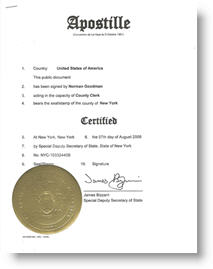Peru’s Congress voted on Thursday to abolish the need for legalization of foreign public documents by Peruvian consulates. The bill ratifies The Hague Convention on this issue, signed in October 1961, one of a series of the international court’s conventions governing Private International Law.
Instead of requiring that foreign public documents, legalized in the country of origin, also be legalized at the nearest Peruvian consulate, the documents will only require an apostille, or international certification, issued by a notary, county clerk or similar authority in the country of origin.

This decision will cut costs and time significantly, simplifying all procedures in which foreign documents are presented for personal or business reasons (university degrees, birth certificates, powers of attorney, company incorporations, etc). As Fritz Dubois, editor of Peru.21, points out, this will greatly benefit foreign investment and trade, as well as some three million Peruvians who live abroad and often have to do paperwork through the consular offices.
With the use of the international certification, the lengthy chain of notary legalization, consular legalization, official translation, and Ministry of Foreign Affairs ratification is cut down to one step (country of origin notary legalization), plus an unofficial translation of the document.
The bill was approved by 66 votes. Opinions opposing the bill were presented by the notary and translator colleges as well as by the Ministry of Foreign Affairs, which decried its loss of income.





